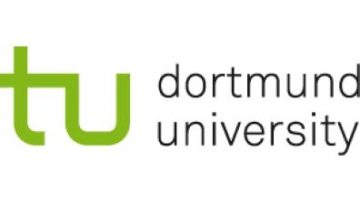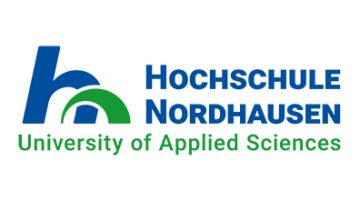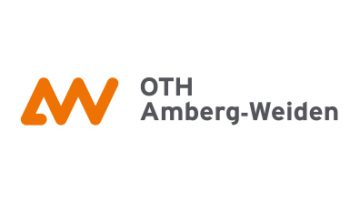Driving Innovation and Preservation: Science Lecture 2024 in Guangzhou
Hosted by the DAAD (German Academic Exchange Service) in collaboration with the Consulate General of Germany in Guangzhou, Fraunhofer-Gesellschaft, and EURAXESS China, the event served as a platform for exploring the latest advancements in circular bioeconomy and sustainable technologies.
Fraunhofer
Drawing a diverse audience—including international researchers, postgraduate students, industry experts, and alumni—the Science Lecture 2024 emphasized innovative approaches to resource management, technological development, and cultural preservation. Together, attendees delved into solutions for resource management and bioeconomy, reflecting the collective ambition to create a more sustainable and interconnected future.
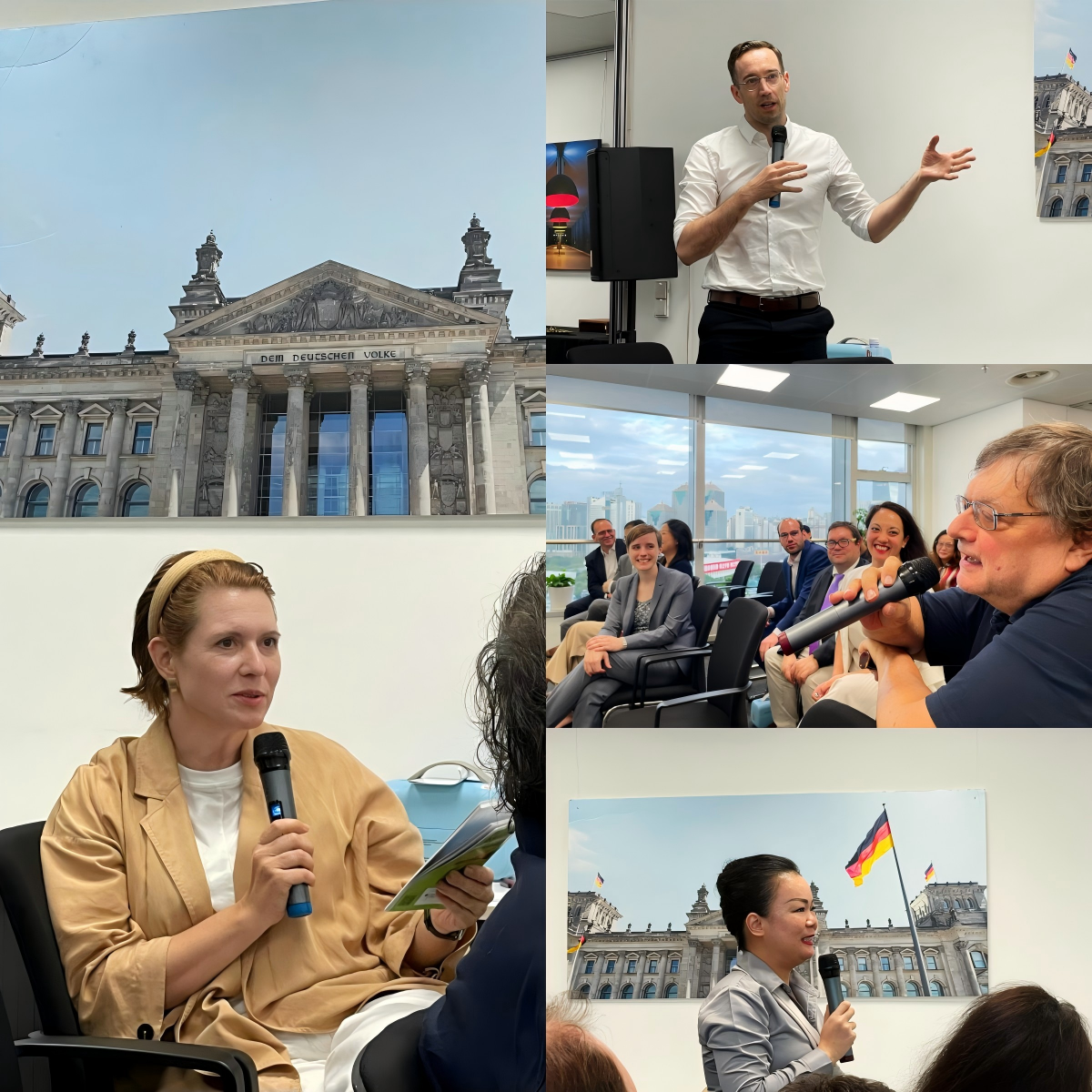
© GK Kanton
Technological Innovation for a Sustainable Future
Dr. Johann Feckl, Director of Pre-Competitive Research and International Affairs at Fraunhofer-Gesellschaft, delivered a visionary keynote exploring the transformative potential of circular bioeconomy. Grounded in global trends and Fraunhofer’s pioneering research, his presentation offered a profound analysis of the innovations shaping the future of sustainability.
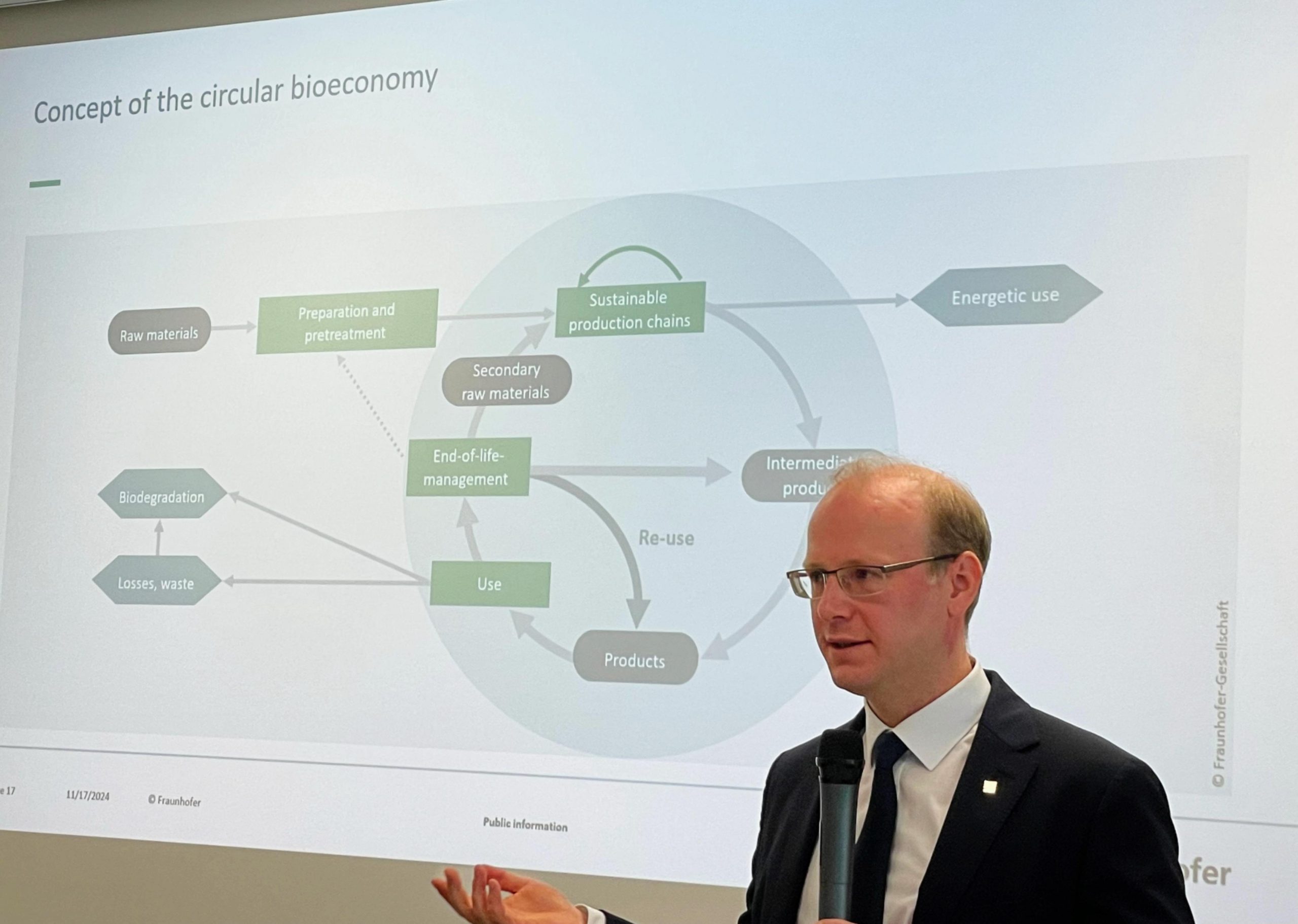
Dr. Johann Feckl presenting his visionary keynote on circular bioeconomy and sustainable innovation.© GK Kanton
Dr. Feckl outlined a compelling vision for the transition to a circular economy, emphasizing the critical role of bio-based materials and renewable resources. Drawing on examples from Germany, China, and beyond, he illuminated how such approaches could drive the development of resilient and sustainable systems. His discussion extended to revolutionary advancements in agriculture and manufacturing, showcasing how technology can underpin global food security while mitigating environmental impact.
A standout example from Fraunhofer’s research was the Future Proteins Project, which explores solutions to meet the growing global demand for sustainable protein sources. By harnessing bioengineering and renewable raw materials, this initiative demonstrates how scientific advancements can transform food production systems, reduce dependency on resource-intensive methods, and support the global shift towards a circular bioeconomy. Similarly, Fraunhofer’s work in green chemistry highlighted the potential for designing environmentally friendly materials and processes that minimize waste and energy consumption across industries.
Through his eloquent exploration of these topics, Dr. Feckl inspired the audience with a comprehensive perspective on how technological innovation can tackle the pressing environmental challenges of our time. His keynote underscored the potential of interdisciplinary research and international cooperation in shaping a sustainable future.
Sustainability meets Preservation
Dr. Mosha Zhao, Assistant Professor at Tongji University and a leading figure in heritage conservation, delivered a thought-provoking keynote that bridged sustainability and cultural heritage. Her presentation underscored the critical importance of preserving historic buildings as vital sources of cultural identity while addressing the environmental challenges of our time.

© Dr. Zhao Mosha
Dr. Zhao emphasized that energy retrofitting of heritage sites serves as a powerful tool for future generations, aiming to ensure that these structures remain in active use rather than being neglected or demolished. This approach not only protects cultural heritage but also contributes to environmental sustainability and CO₂ reduction.
Dr. Zhao introduced strategies for sustainable preservation, focusing on reducing energy consumption without compromising historical integrity. She explored how adaptive reuse and hygrothermal performance enhancement can keep heritage buildings functional and relevant, ensuring their long-term resilience. By integrating these methods with the principles of circular bioeconomy, her work highlights the potential for sustainable restoration practices that minimize environmental impact and conserve resources.
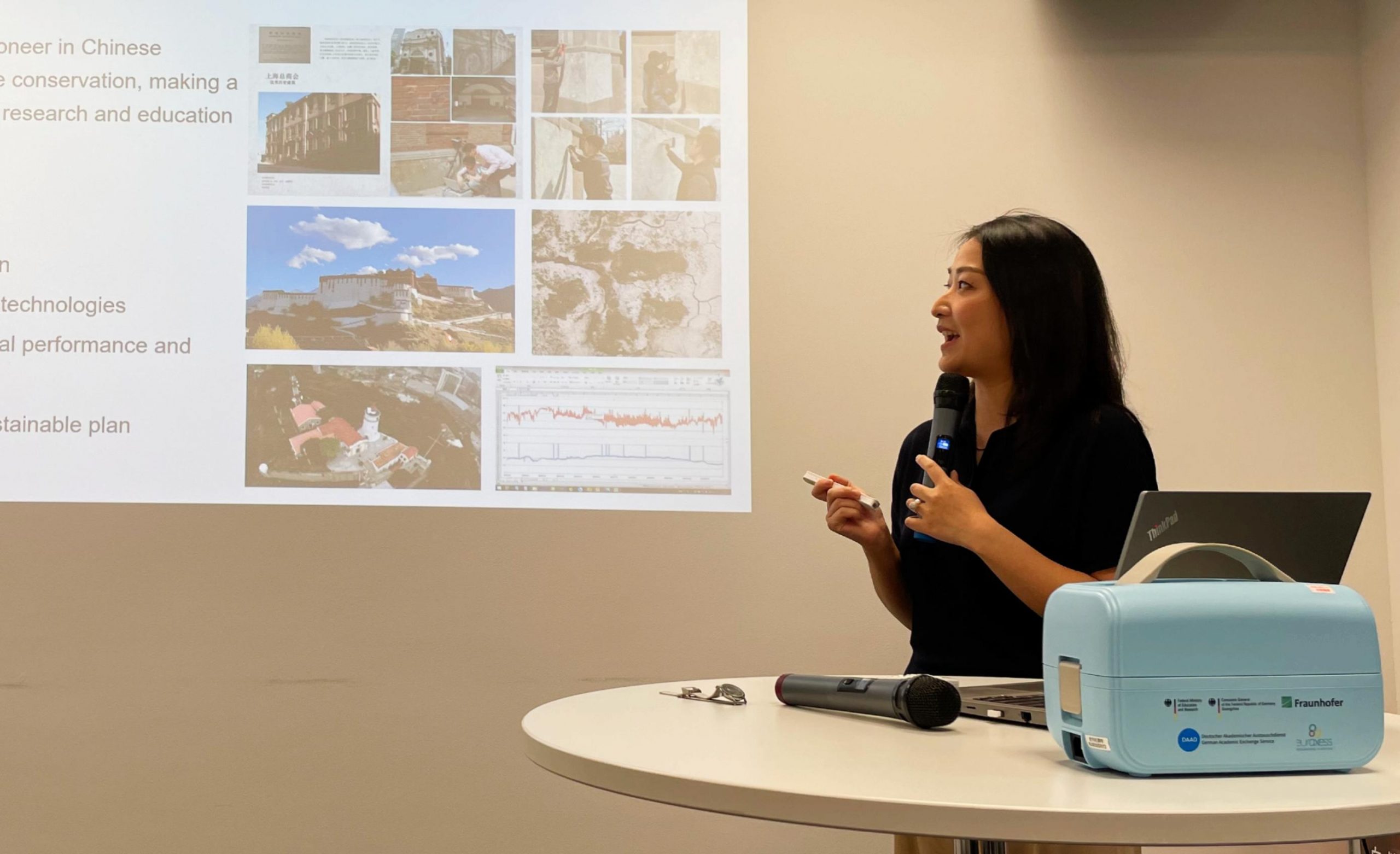
Dr. Mosha Zhao delivering her inspiring insights into sustainable heritage conservation and energy-retrofitting.© GK Kanton
A key challenge in this endeavor, as Dr. Zhao noted, lies in establishing realistic boundary conditions for the application of numerical simulation tools. In regions with intense rain seasons, the influence of wind-driven rain remains insufficiently understood, complicating efforts to predict and optimize building performance. To address this, Dr. Zhao stressed the importance of ongoing monitoring and analysis, calling for collaborative research to refine simulation models and provide actionable insights.
Through her focus on innovative solutions and Sino-German research collaboration, Dr. Zhao illustrated how heritage conservation can intersect with cutting-edge science and sustainability. Her vision inspires new ways of thinking about preserving cultural landmarks while embracing environmental responsibility, ultimately aligning conservation efforts with global goals for a sustainable future.
Inspiring Global Collaboration
As the Science Lecture 2024 in Guangzhou unfolded, it became clear that fostering connections and exchanging ideas lay at the core of the event. The insightful discussions and presentations by speakers and participants highlighted the intrinsic link between collaboration and innovation, advancing possibilities for sustainable technologies and research development.
This spirit of cooperation culminated in the event’s final segment, Inspiring Global Collaboration. The Falling Walls Lab 2025 in Guangzhou exemplified the concept of breaking down barriers—bridging disciplines, cultures, and perspectives to address global challenges.
Each year, DAAD hosts Falling Walls Labs in regions across the globe to highlight the quality, diversity, and passion of their brightest minds. This international competition invites young visionaries to pitch their ideas, research projects, or initiatives in front of a jury of experts and an engaged audience. Since its inception, the Falling Walls Lab has been held in over 80 countries, achieving remarkable success, including in China.
Melanie Späthe, DAAD-Lecturer notes: “Breaking down walls begins with bold ideas. The Falling Walls Lab empowers visionary minds to transform challenges into opportunities, shaping a sustainable and innovative future.”
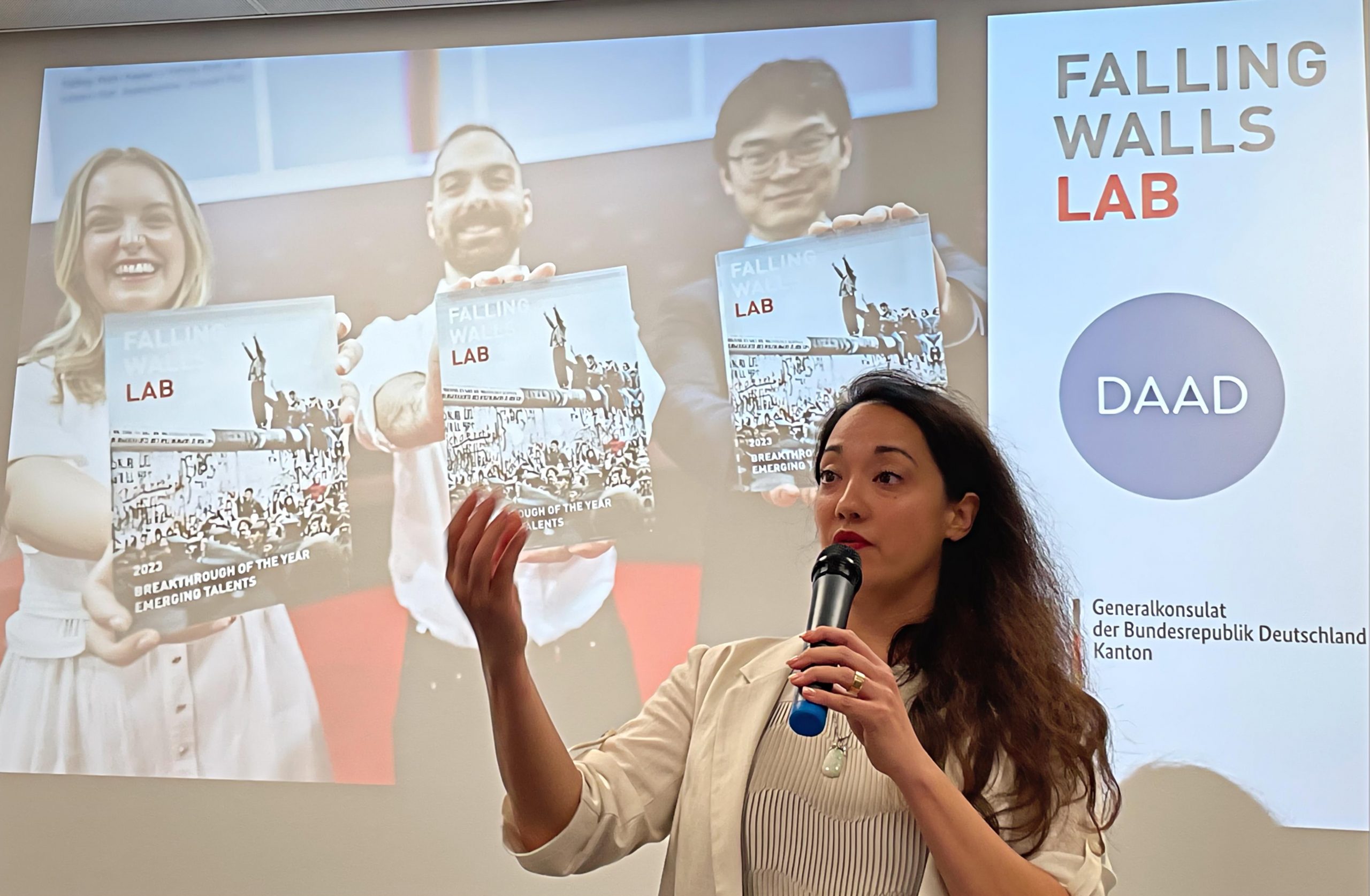
Melanie Späthe showcasing the Falling Walls Lab and fostering dialogue on innovation and sustainability.© GK Kanton
Open to both Chinese nationals and non-Chinese researchers based in China, the lab showcases groundbreaking ideas that span disciplines. The winner of the China competition earns a coveted spot at the global finals in Berlin, Germany, where they join an international community of researchers and innovators to exchange ideas and forge connections.
As this year’s winners prepare to represent China at the global finale, their ideas are set to contribute meaningfully to the ongoing dialogue on research, sustainability, and innovation. The Falling Walls Lab remains a platform for fostering intellectual exchange and envisioning a more sustainable and interconnected future.
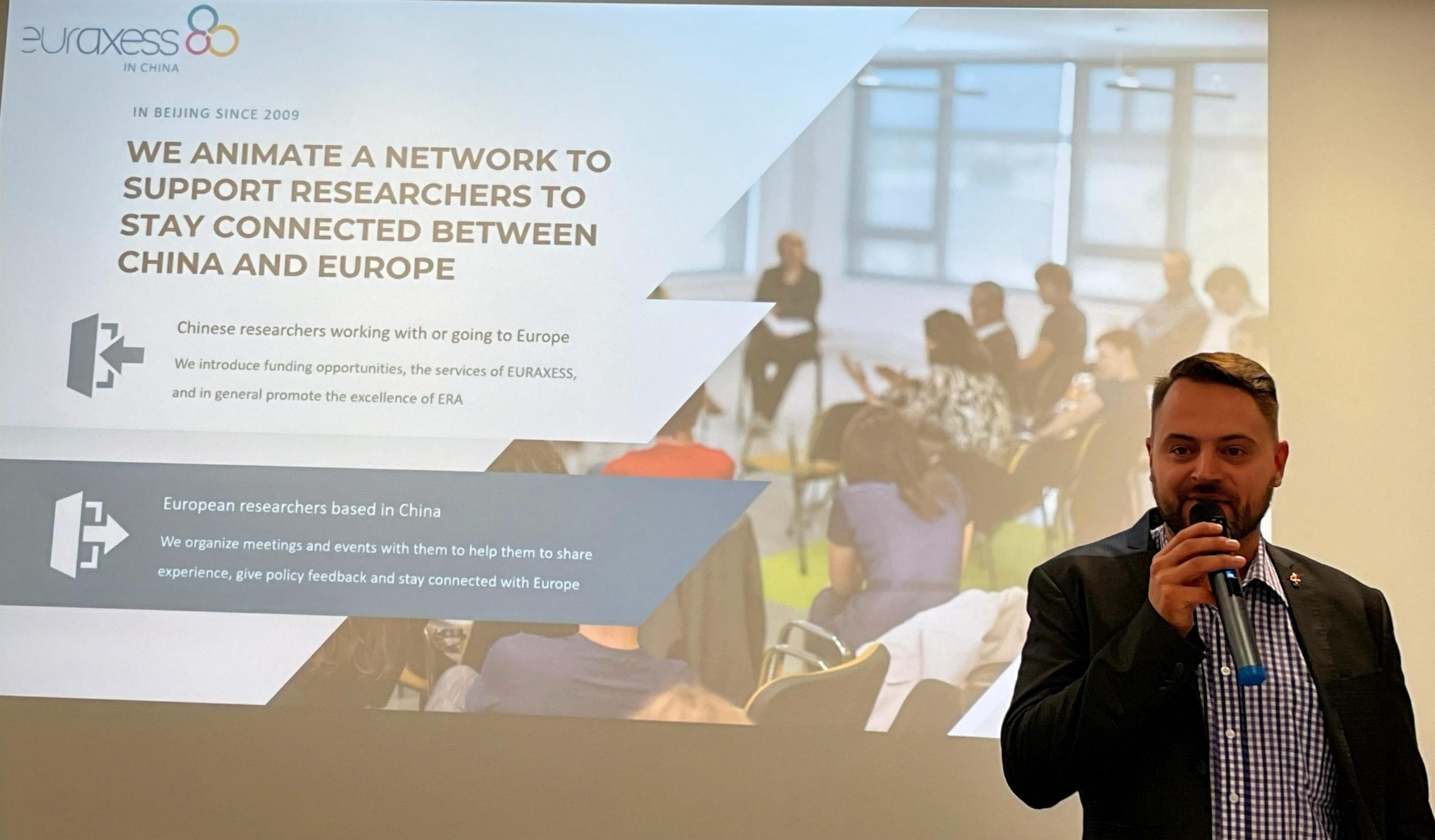
Dr. Karlis Rokpelnis representing EURAXESS China, highlighting opportunities for researchers to connect and collaborate globally.© GK Kanton
Fostering global collaboration and supporting emerging innovators are essential to addressing today’s complex challenges. In this spirit, the EU Commission funded EURAXESS China plays a pivotal role in connecting researchers across borders, enabling them to access resources, build international partnerships, and contribute to groundbreaking discoveries. Offering resources such as funding opportunities, mobility guidance, and events to facilitate networking, EURAXESS connects researchers with institutions, mentors, and peers across Europe and beyond. Chinese and European researchers in China can all benefit from the services that EURAXESS provides to the researcher community free of charge.
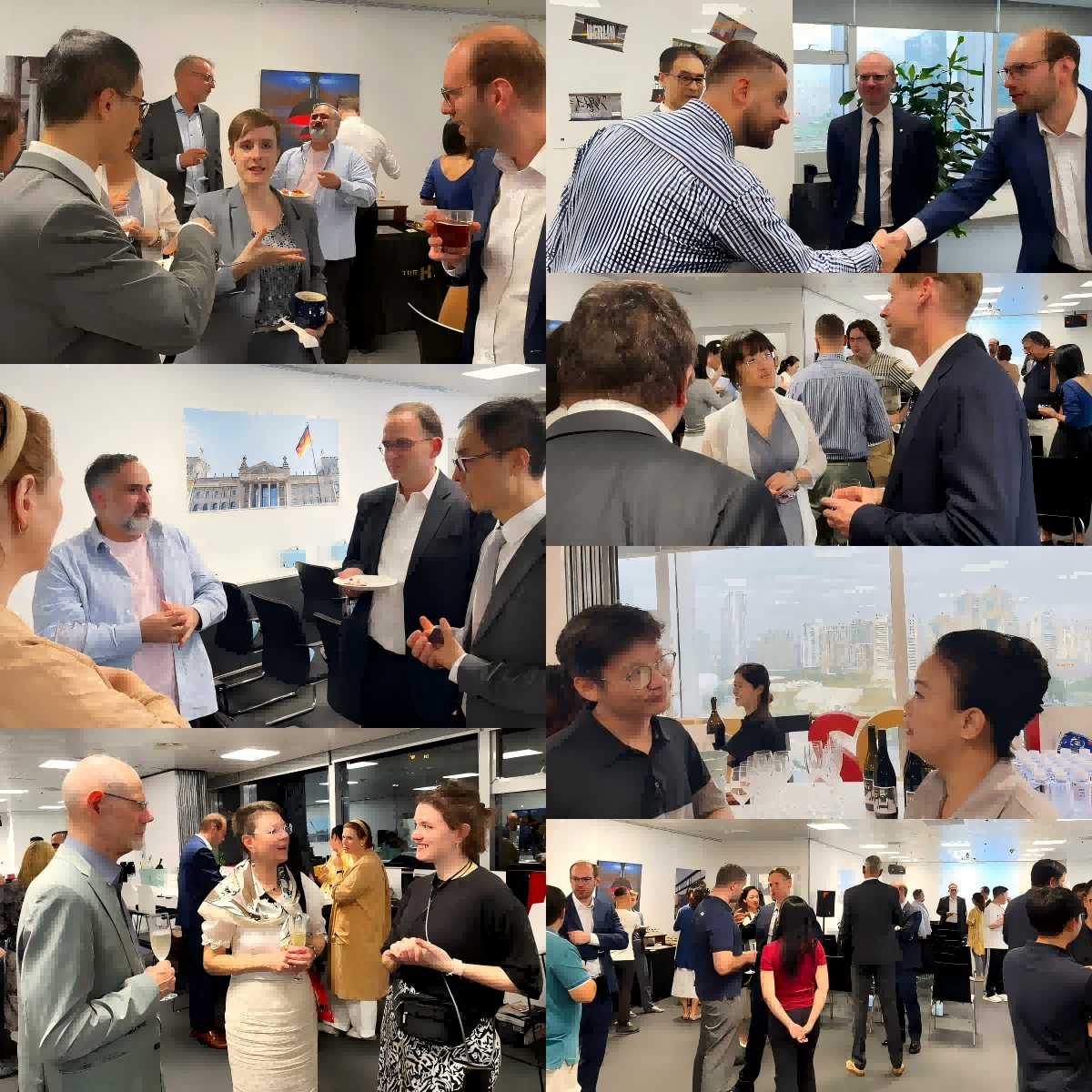
© GK Kanton
Text/Melanie Späthe





